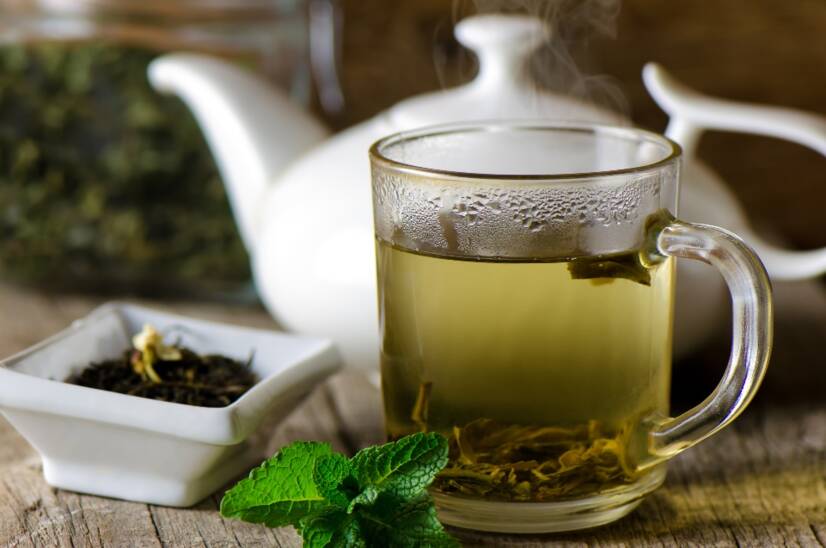- MANDŽUKOVÁ, Jarmila. Herbs: the healing power of nature. Prague: Euromedia Group, 2020. Essence. ISBN 978-80-7617-918-9
- solen.cz - Green tea - a source of valuable substances for use in therapy. Solen. doc. RNDr. Jiřina Spilková, CSc., PharmDr. Tomáš Siatka, CSc.
- healthline.com - 10 Evidence-Based Benefits of Green Tea. Healthline. Atli Arnarson BSc, PhD
- medicalnewstoday.com - What are the health benefits of green tea? Medical News Today. Kathy W. Warwick, R.D., CDE
Green tea: what does it contain and what are its health benefits? Does it help with weight loss?

Green tea is one of the most popular teas and hot drinks worldwide. Its existence has been mentioned for thousands of years. It originates from China and is known for its many health benefits. What does green tea contain and how does it affect human health?
Article content
Green tea is referred to in many studies and cultures as a health drink, the tea of eternal life and similar nicknames based on its beneficial effects. It is characterized by its distinctive aroma, bitter taste and green colour.
Nowadays, green tea is also found in the form of a dietary supplement extract.
The content and composition, health effects, effect on weight loss and many other interesting information can be found in the article.
What is green tea?
Green tea is prepared from the unoxidized tea leaves of the Camelia sinensis plant. It is made from the leaves of the Chinese tea plant, which do not undergo a long oxidation process during processing.
Green tea, like black tea, is made from tea leaves. The difference between the two is in the processing itself.
The leaves used to produce black tea undergo a short oxidation process (withering). In contrast, green tea leaves are processed only by steaming or roasting, which leads to a halt in the oxidation process.
The tea leaves thus contain chlorophyll and tannins while retaining their natural green colour.
This processing preserves important natural substances beneficial to human health.
Green tea comes in various forms:
- In the form of whole leaves.
- In the form of crushed leaves
- Instant powder
- Liquid extract
- Extract in capsules
- Effervescent tablets
What does green tea contain?
Green tea has a high content of active antioxidants, the most common group of which are flavenoids. The group of flavenoids (called catechins) is found in green tea in high concentrations.
The most abundant is epigallocatechin-3-gallate, abbreviated as EGCG, which accounts for approximately 59 % of the total catechin content in tea.
However, the exact content and proportion of catechins depends on the exact type and processing of the tea.
Green tea contains catechins, caffeine (theine), amino acids (L-theanine), vitamins and minerals, as well as substances such as tannins, chlorophyll and saponins. 100 ml of green tea has approximately only 1 calorie.
In addition to the catechins already mentioned, green tea is nutritionally very rich in vitamins and minerals. It contains vitamins of groups A, C, B, E, potassium, calcium, phosphorus, iron, zinc, copper or manganese.
The caffeine content of green tea depends on the particular producer. However, it is a smaller proportion of caffeine than is contained in coffee.
Tein is the name for the caffeine contained in green tea.
One cup of green tea contains approximately 35-80 mg of caffeine, while a cup of coffee contains 100-400 mg of caffeine (depending on the exact type of coffee).
Green tea content:
- Catechin (polyphenol) content
- Caffeine (theine)
- Vitamins
- Minerals
- Amino acids
1. Catechins are behind the positive effects of tea for their antioxidant and anti-inflammatory effects, promoting metabolism and thermoregulation, lowering cholesterol, blood pressure and many others.
2. Caffeine (theine) acts in tea as a brain stimulant and has a stimulating effect. It has a milder effect but for a longer period of time.
3. The amino acid L-theanine has a calming effect, inducing a sense of relaxation and calm without feeling drowsy or tired.
4. Vitamins and minerals are not the main elements of green tea, but their beneficial effect on the human body is indispensable.

Health effects of green tea
Green tea is considered one of the most effective remedies for preventing a large variety of diseases and health problems.
Apart from its taste, tea has a beneficial effect on many physical and mental processes in the body. It is also known as the drink of long life in Eastern cultures for its beneficial effects.
Promoting immunity and overall health
The catechins and flavonoids contained in green tea have many beneficial effects on the immune system and the body's defences. Catechins are particularly known for their anti-inflammatory effect. Some studies have reported antibacterial and antiviral effects.
EGCG, a catechin found in green tea, is considered a natural cancer fighter because of its antioxidant effects. EGCG blocks an enzyme called urokinase, which is produced by cancer cells.
The effect is therefore related to its antioxidant potential and its ability to destroy free radicals.
Prevention of oral health
The anti-inflammatory effect of green tea prevents the risk of tooth decay and eliminates local inflammation in the oral cavity. The tea contains natural fluoride, which also strengthens tooth enamel and prevents tooth decay.
Green tea can be used as a remedy against bad breath.
Prevention of cardiovascular disease
Among other things, green tea has a beneficial effect on the prevention of cardiovascular disease. Various studies have confirmed that drinking green tea lowers LDL cholesterol and triglyceride levels.
It regulates the level of good cholesterol and, in turn, prevents the absorption of bad cholesterol from food. According to several studies, green tea also reduces blood sugar levels. It relaxes blood vessels, thereby lowering blood pressure.
Promotes brain function and mood
Due to its caffeine content, green tea is a stimulant that gives the body energy without the unpleasant side effects of caffeine.
The moderate dose of caffeine in the tea has stimulating effects on brain activity. It promotes reaction, attention, memory and learning. According to some studies, it supports the prevention of neurological Alzheimer's and Parkinson's diseases.
Thanks to its L-theanine content, the tea suppresses depression and relieves stress. It has a calming and relaxing effect. It therefore has a beneficial effect on the mood and psychological state of the individual. However, it does not lead to depression and a feeling of drowsiness.
Effects on skin and complexion
Green tea has strong anti-inflammatory effects due to its catechin content. It promotes skin health, soothes the skin, removes redness, swelling and acne (inflammation). It tightens pores and eliminates sebum production.
Tea contains vitamins B and E excellent for promoting skin firmness and elasticity. Green tea mask or cream soothes the skin, reduces inflammation and reduces oiliness.
Green tea for weight loss: does it really work?
According to several available studies, green tea can promote weight loss.
Drinking green tea promotes energy metabolism and fat burning.
The effect on promoting weight loss is mainly due to the presence of caffeine, which has both stimulating effects on physical performance and accelerates metabolism.
The tea has a mild diuretic effect, thus ridding the body of excess body water, swelling and waterlogging.
Intake of green tea promotes detoxification of the liver organ and provides protection against various liver diseases. However, in rare cases, excessive consumption of the extract can lead to liver damage.
Caffeine and green tea extract are common ingredients in dietary supplements to support energy metabolism and fat burning.
However, it is important to note that it is not possible to lose excess pounds without dietary modification(calorie deficit), despite drinking green tea regularly.
However, several studies have shown the excellent burning effect of a combination of green tea consumption, physical activity and dietary modification.
Consumption and recommended daily dose
Green tea is safe for healthy individuals, however, if consumed in moderation and in accordance with the recommended dosage.
As such, green tea extract does not cause any side effects.
However, there is a risk of side effects from caffeine, L-theanine and catechins if the recommended daily dose is exceeded.
The theanine contained in green tea can increase the production of stomach acid at high doses. This can then cause digestive problems such as abdominal pain, nausea, heartburn or constipation.
If an individual consumes green tea containing caffeine along with other stimulants, blood pressure and heart rate may subsequently increase.
Possible adverse side effects when the dose is exceeded:
- Headache and migraine
- Poor quality sleep
- Nervousness
- Indigestion
- Increase in heart rate
Studies and sources describing the effects of green tea do not completely agree on the optimal set daily dose. The daily dose also varies depending on what results the research is trying to achieve and what health problem it is targeting.
However, the maximum dose is around 5 cups of green tea per day.
The recommended daily dose of green tea is primarily concerned with the caffeine, catechin and fluoride content.
The maximum recommended daily dose of caffeine per day is set at 400 mg and no more than 200 mg of caffeine should enter the body at any one time.
Green tea contains an average of 35 g of caffeine per 230 ml of beverage.
However, this figure is influenced by the age of the tea leaves, the method of processing and the temperature of the water used.
Who should avoid green tea?
Although green tea has beneficial effects, in some cases and diagnoses, its consumption may not be the most appropriate.
Caution should be taken with drinking green tea by individuals who suffer from any of the following problems:
- Chronic digestive problems
- Sensitive stomach
- Elevated stomach acid levels
- Iron deficiency and anemia
- Heart disease and high blood pressure
- Increased sensitivity to caffeine
- Hypoglycaemia
One risk may be increased sensitivity to caffeine manifested by poor sleep quality, irritability, nausea or stomach problems.
Because green tea contains tannins that can interfere with (reduce) proper iron absorption, it is recommended not to drink tea at the same time as consuming iron-rich foods.
Green tea can cause the blocking effect of some drugs and medicines, especially drug therapies designed to lower blood pressure.
The risk of exceeding the maximum recommended dose is liver damage.
Care should be taken with dosage, especially in pregnant and lactating women, who may drink a maximum of 1 to 2 cups of green tea per day. The ingredients caffeine, catechins and tannins may be risky in pregnancy.
It is therefore advisable to consult a gynaecologist when drinking green tea and caffeine.
When breastfeeding, caffeine through breast milk can affect the baby's behaviour. For this reason, green tea is not recommended to be given to young children.
Preparation of green tea
When preparing green tea, boiling water is not suitable, but a slightly lower temperature. The temperature of the water should be around 70-80 °C and should not exceed 90 °C.
Green tea should be steeped for approximately one to two minutes according to the manufacturer's recommendations on the product packaging.
It is not recommended to leave the tea to steep longer than recommended, especially because of the taste (bitterness) and the increase in metal content with long steeping.
If you choose to drink green tea regularly for its positive health benefits, you should invest in its quality.
Choose loose teas that are unflavoured and come directly from the leaves of the tea plant (not from other parts of the plant).
However, the quality always depends on the particular producer.
Interesting resources
Related










